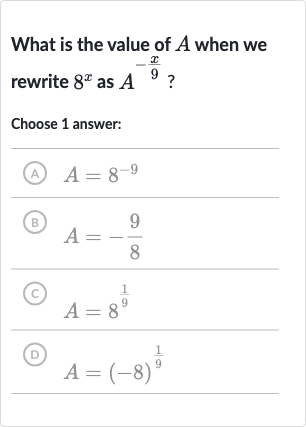Full solution
Q. What is the value of when we rewrite as ?Choose answer:(A) (B) (C) (D)
- Expressing ^x in the form of A^(-x/): We need to express in the form of . To do this, we need to find a value for such that when raised to the power of , it is equivalent to .
- Rewriting ^x as (^(/))^(x): First, let's rewrite as because . This is because raising a number to a power and then raising it to another power is the same as multiplying the exponents.
- Taking the reciprocal of the base: Now, we want to match the form . To do this, we need to take the reciprocal of the base inside the parentheses, which will change the sign of the exponent. So, can be written as .
- Determining the value of A: We can now see that must be equal to because is in the form of with being .
- Correct answer: A = ^(/): Therefore, the correct answer is , which corresponds to choice (C).
More problems from Compare linear and exponential growth
QuestionGet tutor help
QuestionGet tutor help
QuestionGet tutor help
QuestionGet tutor help
QuestionGet tutor help
QuestionGet tutor help
QuestionGet tutor help

